

50 Useful Academic Words & Phrases for Research
Like all good writing, writing an academic paper takes a certain level of skill to express your ideas and arguments in a way that is natural and that meets a level of academic sophistication. The terms, expressions, and phrases you use in your research paper must be of an appropriate level to be submitted to academic journals.
Therefore, authors need to know which verbs , nouns , and phrases to apply to create a paper that is not only easy to understand, but which conveys an understanding of academic conventions. Using the correct terminology and usage shows journal editors and fellow researchers that you are a competent writer and thinker, while using non-academic language might make them question your writing ability, as well as your critical reasoning skills.
What are academic words and phrases?
One way to understand what constitutes good academic writing is to read a lot of published research to find patterns of usage in different contexts. However, it may take an author countless hours of reading and might not be the most helpful advice when faced with an upcoming deadline on a manuscript draft.
Briefly, “academic” language includes terms, phrases, expressions, transitions, and sometimes symbols and abbreviations that help the pieces of an academic text fit together. When writing an academic text–whether it is a book report, annotated bibliography, research paper, research poster, lab report, research proposal, thesis, or manuscript for publication–authors must follow academic writing conventions. You can often find handy academic writing tips and guidelines by consulting the style manual of the text you are writing (i.e., APA Style , MLA Style , or Chicago Style ).
However, sometimes it can be helpful to have a list of academic words and expressions like the ones in this article to use as a “cheat sheet” for substituting the better term in a given context.
How to Choose the Best Academic Terms
You can think of writing “academically” as writing in a way that conveys one’s meaning effectively but concisely. For instance, while the term “take a look at” is a perfectly fine way to express an action in everyday English, a term like “analyze” would certainly be more suitable in most academic contexts. It takes up fewer words on the page and is used much more often in published academic papers.
You can use one handy guideline when choosing the most academic term: When faced with a choice between two different terms, use the Latinate version of the term. Here is a brief list of common verbs versus their academic counterparts:
Although this can be a useful tip to help academic authors, it can be difficult to memorize dozens of Latinate verbs. Using an AI paraphrasing tool or proofreading tool can help you instantly find more appropriate academic terms, so consider using such revision tools while you draft to improve your writing.
Top 50 Words and Phrases for Different Sections in a Research Paper
The “Latinate verb rule” is just one tool in your arsenal of academic writing, and there are many more out there. But to make the process of finding academic language a bit easier for you, we have compiled a list of 50 vital academic words and phrases, divided into specific categories and use cases, each with an explanation and contextual example.
Best Words and Phrases to use in an Introduction section
1. historically.
An adverb used to indicate a time perspective, especially when describing the background of a given topic.
2. In recent years
A temporal marker emphasizing recent developments, often used at the very beginning of your Introduction section.
3. It is widely acknowledged that
A “form phrase” indicating a broad consensus among researchers and/or the general public. Often used in the literature review section to build upon a foundation of established scientific knowledge.
4. There has been growing interest in
Highlights increasing attention to a topic and tells the reader why your study might be important to this field of research.
5. Preliminary observations indicate
Shares early insights or findings while hedging on making any definitive conclusions. Modal verbs like may , might , and could are often used with this expression.
6. This study aims to
Describes the goal of the research and is a form phrase very often used in the research objective or even the hypothesis of a research paper .
7. Despite its significance
Highlights the importance of a matter that might be overlooked. It is also frequently used in the rationale of the study section to show how your study’s aim and scope build on previous studies.
8. While numerous studies have focused on
Indicates the existing body of work on a topic while pointing to the shortcomings of certain aspects of that research. Helps focus the reader on the question, “What is missing from our knowledge of this topic?” This is often used alongside the statement of the problem in research papers.
9. The purpose of this research is
A form phrase that directly states the aim of the study.
10. The question arises (about/whether)
Poses a query or research problem statement for the reader to acknowledge.
Best Words and Phrases for Clarifying Information
11. in other words.
Introduces a synopsis or the rephrasing of a statement for clarity. This is often used in the Discussion section statement to explain the implications of the study .
12. That is to say
Provides clarification, similar to “in other words.”
13. To put it simply
Simplifies a complex idea, often for a more general readership.
14. To clarify
Specifically indicates to the reader a direct elaboration of a previous point.
15. More specifically
Narrows down a general statement from a broader one. Often used in the Discussion section to clarify the meaning of a specific result.
16. To elaborate
Expands on a point made previously.
17. In detail
Indicates a deeper dive into information.
Points out specifics. Similar meaning to “specifically” or “especially.”
19. This means that
Explains implications and/or interprets the meaning of the Results section .
20. Moreover
Expands a prior point to a broader one that shows the greater context or wider argument.
Best Words and Phrases for Giving Examples
21. for instance.
Provides a specific case that fits into the point being made.
22. As an illustration
Demonstrates a point in full or in part.
23. To illustrate
Shows a clear picture of the point being made.
24. For example
Presents a particular instance. Same meaning as “for instance.”
25. Such as
Lists specifics that comprise a broader category or assertion being made.
26. Including
Offers examples as part of a larger list.
27. Notably
Adverb highlighting an important example. Similar meaning to “especially.”
28. Especially
Adverb that emphasizes a significant instance.
29. In particular
Draws attention to a specific point.
30. To name a few
Indicates examples than previously mentioned are about to be named.
Best Words and Phrases for Comparing and Contrasting
31. however.
Introduces a contrasting idea.
32. On the other hand
Highlights an alternative view or fact.
33. Conversely
Indicates an opposing or reversed idea to the one just mentioned.
34. Similarly
Shows likeness or parallels between two ideas, objects, or situations.
35. Likewise
Indicates agreement with a previous point.
36. In contrast
Draws a distinction between two points.
37. Nevertheless
Introduces a contrasting point, despite what has been said.
38. Whereas
Compares two distinct entities or ideas.
Indicates a contrast between two points.
Signals an unexpected contrast.
Best Words and Phrases to use in a Conclusion section
41. in conclusion.
Signifies the beginning of the closing argument.
42. To sum up
Offers a brief summary.
43. In summary
Signals a concise recap.
44. Ultimately
Reflects the final or main point.
45. Overall
Gives a general concluding statement.
Indicates a resulting conclusion.
Demonstrates a logical conclusion.
48. Therefore
Connects a cause and its effect.
49. It can be concluded that
Clearly states a conclusion derived from the data.
50. Taking everything into consideration
Reflects on all the discussed points before concluding.
Edit Your Research Terms and Phrases Before Submission
Using these phrases in the proper places in your research papers can enhance the clarity, flow, and persuasiveness of your writing, especially in the Introduction section and Discussion section, which together make up the majority of your paper’s text in most academic domains.
However, it's vital to ensure each phrase is contextually appropriate to avoid redundancy or misinterpretation. As mentioned at the top of this article, the best way to do this is to 1) use an AI text editor , free AI paraphrase tool or AI proofreading tool while you draft to enhance your writing, and 2) consult a professional proofreading service like Wordvice, which has human editors well versed in the terminology and conventions of the specific subject area of your academic documents.
For more detailed information on using AI tools to write a research paper and the best AI tools for research , check out the Wordvice AI Blog .

Academic Phrasebank
- GENERAL LANGUAGE FUNCTIONS
- Being cautious
- Being critical
- Classifying and listing
- Compare and contrast
- Defining terms
- Describing trends
- Describing quantities
- Explaining causality
- Giving examples
- Signalling transition
- Writing about the past
The Academic Phrasebank is a general resource for academic writers. It aims to provide you with examples of some of the phraseological ‘nuts and bolts’ of writing organised according to the main sections of a research paper or dissertation (see the top menu ). Other phrases are listed under the more general communicative functions of academic writing (see the menu on the left). The resource should be particularly useful for writers who need to report their research work. The phrases, and the headings under which they are listed, can be used simply to assist you in thinking about the content and organisation of your own writing, or the phrases can be incorporated into your writing where this is appropriate. In most cases, a certain amount of creativity and adaptation will be necessary when a phrase is used. The items in the Academic Phrasebank are mostly content neutral and generic in nature; in using them, therefore, you are not stealing other people’s ideas and this does not constitute plagiarism. For some of the entries, specific content words have been included for illustrative purposes, and these should be substituted when the phrases are used. The resource was designed primarily for academic and scientific writers who are non-native speakers of English. However, native speaker writers may still find much of the material helpful. In fact, recent data suggest that the majority of users are native speakers of English. More about Academic Phrasebank .
This site was created by John Morley .
Academic Phrasebank is the Intellectual Property of the University of Manchester.
Copyright © 2023 The University of Manchester
+44 (0) 161 306 6000
The University of Manchester Oxford Rd Manchester M13 9PL UK

Connect With Us
The University of Manchester
- How it works
"Christmas Offer"
Terms & conditions.
As the Christmas season is upon us, we find ourselves reflecting on the past year and those who we have helped to shape their future. It’s been quite a year for us all! The end of the year brings no greater joy than the opportunity to express to you Christmas greetings and good wishes.
At this special time of year, Research Prospect brings joyful discount of 10% on all its services. May your Christmas and New Year be filled with joy.
We are looking back with appreciation for your loyalty and looking forward to moving into the New Year together.
"Claim this offer"
In unfamiliar and hard times, we have stuck by you. This Christmas, Research Prospect brings you all the joy with exciting discount of 10% on all its services.
Offer valid till 5-1-2024
We love being your partner in success. We know you have been working hard lately, take a break this holiday season to spend time with your loved ones while we make sure you succeed in your academics
Discount code: RP0996Y

Your content here...

Glossary in a Dissertation – A Comprehensive Guide
Published by Owen Ingram at August 26th, 2021 , Revised On September 20, 2023
A list of glossary contains all those terms used in your dissertation, but the meanings of which may not be evident to the readers. Here is all you need to know about the glossary in a dissertation.
Basically, any term you use in your dissertation that you know, without a doubt, is not going to be common knowledge to readers outside of your field, is included in a list called glossary. And since every field has its unique, technical jargon, a glossary list can contain many terms some readers might not have even heard of before.
A typical glossary in a dissertation may look something like this:
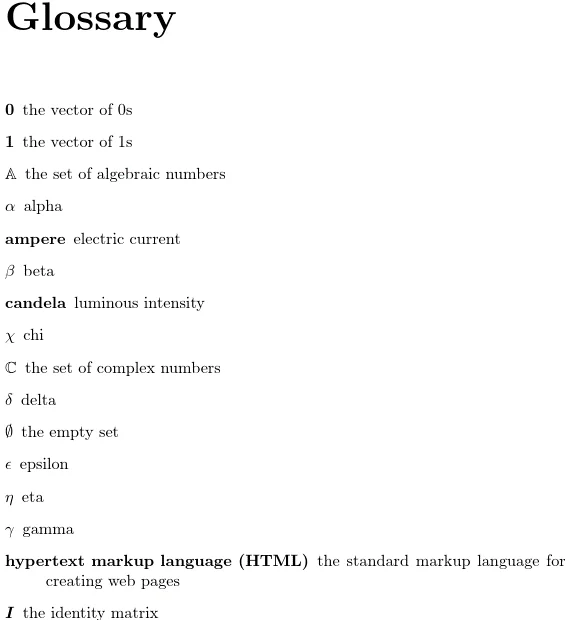
Do you Even Need Glossary in your Dissertation to Begin with?
You may or may not be required to have a separate list of glossaries in your dissertation . The decision whether to have a list of glossaries in a dissertation depends on whether it will improve the readability of your paper.
For example , if you are writing a dissertation for an engineering degree and have used several technical terms that readers—especially laymen—may not be familiar with, \ it is advised to add a glossary in a dissertation.
Listing Terms in a Glossary
A recommended practice of adding a glossary in a dissertation is to sort the terms alphabetically and provide a definition or explanations for each of those terms. Having the terms listed in alphabetical order will help the readers to easily locate the information they are interested in.
Location of a Glossary List in a Dissertation
The glossary list is generally placed at the beginning of the dissertation paper, just after the list of tables and figures or the list of abbreviations. However, if your paper does not have a list of abbreviations or a list of tables and figures, you can place the glossary right after the table of contents .
This gives readers the opportunity to understand the meanings of key terms they are not familiar with even before they start to read the main content of the paper.
However, if you haven’t used a lot of technical terms in your dissertation, you can choose to provide an explanation and meanings of the few terms that you have used in the form of footnotes .
Difference Between Abbreviations and Glossary
It is important not to confuse the glossary in the dissertation with the abbreviations, which are put in the list of abbreviations.
A list of abbreviations contains all the terms that have abbreviations. For instance, if you have used terms like NASA , UNICEF , UNESCO , UN , NIH , etc., such terms along with what they stand for will come under the list of abbreviations.
Note, however, that only their full forms, and not their meanings, are mentioned in that list. That is what’s mentioned in a glossary list, though: meanings. Definitions of terms, terms that were used in the dissertation. The terms themselves aren’t abbreviation.
For instance, in a linguistics’ dissertation, you might end up creating a glossary list containing terms like phenomenology, code-switching, diglossia, etc. Notice how these are complete terms , not abbreviations.
Looking for dissertation help?
Researchprospect to the rescue then.
We have expert writers on our team who are skilled at helping students with quantitative dissertations across various disciplines. Guaranteeing 100% satisfaction!

Example of a Glossary in Dissertation
If you haven’t created a list of glossaries before then you will find the below example of a glossary in a dissertation particularly useful:
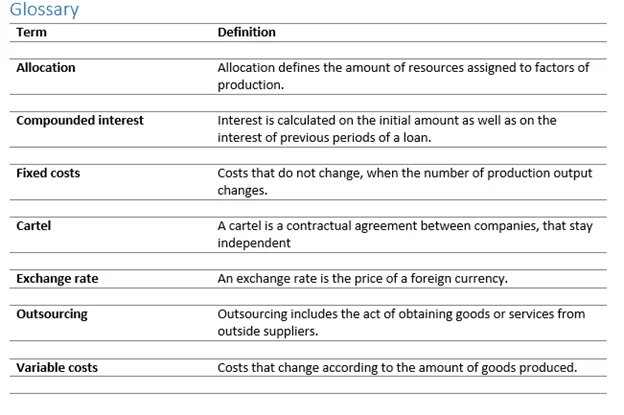
Other Lists you can have in your Dissertation
You might also want to have a list of tables and figures as well as a list of abbreviations in your dissertation particularly if you are writing a master’s or PhD dissertation. However, make sure to keep the following order:
- Table of contents
- Lists of figures and tables
- List of abbreviations
How Does ResearchProspect can Help
ResearchProspect is UK’s leading dissertation writing service. Our UK-qualified writers are hired following a strict recruitment process which helps us make sure that each of our writers is capable of delivering the quality guarantees we promise to our clients. Whether you need help with the whole dissertation or just a part of it , ResearchProspect can help.
Learn More About Our Dissertation Services
Place Your Order For Dissertation or Individual Chapters Now
FAQs About Glossary in a Dissertation
What is a glossary.
It’s a list of special terms—single words, phrases, etc.—that are not commonly known to the ‘average’ reader or to a reader who isn’t an expert in that field.
What is included in a glossary?
Ideally, words are included in a glossary. However, in some cases—depending on the topic— abbreviations , phrases etc. might also be mentioned within the list of glossary in a dissertation. Sometimes, it might also include a brief definition of how to pronounce a certain word/phrase.
What is the best way to create a glossary?
Keep in mind two things while creating a glossary list: keep the language of the definition simple so that every kind of reader can understand it. That’s why a glossary is given, to begin with, to simplify technical jargon and inform laymen. Secondly, arrange the terms inside it alphabetically.
How many times can I include the same term in a glossary list?
No matter how many times a word or a phrase appears in your dissertation , include it and define it only once in your glossary. There should be no duplicate entries in a glossary list.
You May Also Like
Not sure how to write the findings of a dissertation. Here are some comprehensive guidelines for you to learn to write a flawless findings chapter.
Dissertation Methodology is the crux of dissertation project. In this article, we will provide tips for you to write an amazing dissertation methodology.
How to Structure a Dissertation or Thesis Need interesting and manageable Finance and Accounting dissertation topics? Here are the trending Media dissertation titles so you can choose one most suitable to your needs.
As Featured On

USEFUL LINKS
LEARNING RESOURCES

COMPANY DETAILS

Splash Sol LLC
- How It Works
- Affiliate Program

- UNITED STATES
- 台灣 (TAIWAN)
- TÜRKIYE (TURKEY)
- Academic Editing Services
- - Research Paper
- - Journal Manuscript
- - Dissertation
- - College & University Assignments
- Admissions Editing Services
- - Application Essay
- - Personal Statement
- - Recommendation Letter
- - Cover Letter
- - CV/Resume
- Business Editing Services
- - Business Documents
- - Report & Brochure
- - Website & Blog
- Writer Editing Services
- - Script & Screenplay
- Our Editors
- Client Reviews
- Editing & Proofreading Prices
- Wordvice Points
- Partner Discount
- Plagiarism Checker
- APA Citation Generator
- MLA Citation Generator
- Chicago Citation Generator
- Vancouver Citation Generator
- - APA Style
- - MLA Style
- - Chicago Style
- - Vancouver Style
- Writing & Editing Guide
- Academic Resources
- Admissions Resources
Useful Research Words and Phrases for All Sections
What are the best research words and phrases to use in a paper?
If you are a graduate student, researcher, and/or professor, you already know that composing academic documents can be a frustrating and time-consuming undertaking. In addition to including all the necessary study content, you must also present it in the right order and convey the required information using the proper institutional language. Deciding exactly which language to put in which section can get confusing as you constantly question your choice of phrasing: “ Does the Results section require this kind of explanation? Should I introduce my research with a comparison or with background research? How do I even begin the Discussion section? ”
To help you choose the right word for the right purpose, Wordvice has created a handy academic writing “cheat sheet” with ready-made formulaic expressions for all major sections of a research paper ( Introduction, Literature Review, Methods, Results, Discussion, and Conclusion ) and for reaching different objectives within each section.
This downloadable quick-reference guide contains common phrases used in academic papers, a sample journal submission cover letter, and a template rebuttal letter to be modified and used in case of receipt of a letter from the journal editor.
Each section includes annotations explaining the purposes of the expressions and a summary of essential information so that you can easily find the language your are looking for whenever you need to apply it to your paper. Using this quick reference will help you write more complete and appropriate phrases in your research writing and correspondence with journal editors.
Reference Guide Content
1. common research paper phrases (listed by manuscript section).

- Gathered from hundreds of thousands of published manuscripts, these frequently used key sentences and phrases are tailored to what each section of your paper should accomplish.
- From the abstract to the conclusion, each section is tied together by a logical structure and flow of information.
- Refer to this index when you are unsure of the correct phrases to use (in your paper/article, dissertation, or thesis) or if you are a non-native speaker and are seeking phrasing that is both natural in tone and official in form.
2. Acade mic Search Tools Index

- The search tools index is a concise compilation of some of the best academic research search tools and databases available that contain information about paper composition and relevant journals.
- Locate the sites and tools most useful for your needs using our summary of site content and features.
3. Sample Journal Submission Cover Letter with Formal Expressions

The cover letter is an essential part of the journal submission process, yet a great many researchers struggle with how to compose their cover letters to journal editors in a way that will effectively introduce their study and spur editors to read and consider their manuscript.
This sample cover letter not only provides an exemplary model of what a strong cover letter should look like but includes template language authors can apply directly to their own cover letters. By applying the formal language of the cover letter to the particular details of a particular study, the letter helps authors build a strong opening case for journals to consider accepting their manuscripts for publication.
4. Rebuttal Letter Template
The rebuttal letter is written as a response to previously received correspondence from journal editors that can take the form of a rejection, deferment, or request letter, which often requests changes, additions, or omission of content or augmentation of formatting in the manuscript. The rebuttal letter is therefore usually an author’s last chance to get their manuscript published in a given journal, and the language they use must convince the editor that an author’s manuscript is ready (or will be ready) for publication in their journal. It must therefore contain a precise rationale and explanation to accomplish this goal.
As with the journal submission cover letter, knowing exactly what to include in this letter and how to compose it can be difficult. One must be persuasive without being pushy; formal but yet candid and frank. This template rebuttal letter is constructed to help authors navigate these issues and respond to authors with confidence that they have done everything possible to get their manuscript published in the journal to which they have submitted.
5. Useful Phrases for the Journal Submission Cover Letter/Rebuttal Letter

As with research papers, there are usually dozens of options for how to phrase the language in letters to journal editors. This section suggests several of the most common phrases that authors use to express their objectives and persuade editors to publish their journals. And as with the section on “Common Research Paper Phrases,” you will find here that each phrase is listed under a heading that indicates its objective so that authors know when and where to apply these expressions.
Use this reference guide as another resource in your toolkit to make the research paper writing and journal submission processes a bit easier. And remember that there are many excellent resources out there if you require additional assistance.
Wordvice ‘s academic English editing services include paper editing services , dissertation editing services , and thesis editing services that are specifically tailored to help researchers polish their papers to get the very most out of their research writing. Visit our Resources pages for great articles and videos on academic writing and journal submission.
Wordvice Resources
A guide to paraphrasing in research papers, 100+ strong verbs that will make your research writing amazing , how to compose a journal submission cover letter, how to write the best journal submission cover letter, related resources, 40 useful words and phrases for top-notch essays, “essential academic writing words and phrases” (my english teacher.eu), “academic vocabulary, useful phrases for academic writing and research paper writing” (research gate).

Academic Vocabulary for Essays and Research
Academic vocabulary for essays and research: a comprehensive guide.
Writing essays and research papers is a crucial part of academic life.
Whether you’re a high school student, college undergraduate, or graduate student, mastering academic vocabulary can significantly improve your writing.
This guide will help you understand and use academic vocabulary effectively in your essays and research papers.
What is Academic Vocabulary?
Academic vocabulary refers to the words and phrases commonly used in educational and professional settings.
These words are often more formal and precise than everyday language .
Using academic vocabulary shows that you understand your subject and can communicate ideas clearly and professionally.
Why is Academic Vocabulary Important?
- Precision: Academic words allow you to express complex ideas accurately.
- Professionalism: Using appropriate vocabulary makes your writing sound more scholarly.
- Clarity: The right words help readers understand your points better.
- Credibility: Good vocabulary use shows you’re knowledgeable about your topic.
Key Categories of Academic Vocabulary
Verbs for describing research and analysis.
These verbs help you explain what researchers or writers do:
- Analyze: To examine something in detail
- Evaluate: To judge the quality or importance of something
- Investigate: To study something closely
- Examine: To look at something carefully
- Explore: To study or discuss a subject in detail
Example: “This paper analyzes the effects of social media on teenage mental health.”
Nouns for Describing Research Elements
These nouns refer to different parts of research or academic work:
- Hypothesis: An idea or explanation that you then test through research
- Methodology: The way you do your research
- Data: Information collected during research
- Conclusion: The final judgment or opinion you reach
- Evidence: Facts or information that support an idea or conclusion
Example: “The methodology used in this study involved surveying 500 high school students.”
Adjectives for Describing Ideas or Findings
These adjectives help you describe concepts or results more precisely:
- Significant: Important or noticeable
- Valid: Logically or factually sound
- Relevant: Related to and important for the topic
- Comprehensive: Including all or nearly all elements
- Empirical: Based on observation or experience rather than theory
Example: “The study found a significant link between exercise and improved mood.”
Transition Words and Phrases
These words and phrases help connect ideas and make your writing flow:
- However: Shows contrast
- Furthermore: Adds information
- Consequently: Shows a result
- In contrast: Compares different ideas
- Nevertheless: Despite what was just said
Example: “Exercise improved mood. However, the effect was less noticeable in older participants.”
Words for Structuring Arguments
These words help you present your ideas in a logical order:
- Firstly, Secondly, Finally: For listing points
- In conclusion: To introduce your final thoughts
- To summarize: To briefly restate main points
Example: “Firstly, we’ll look at the causes of climate change. Secondly, we’ll examine its effects. Finally, we’ll discuss possible solutions.”
Words for Citing Sources
These phrases help you introduce information from other sources:
- According to : Used when directly stating what a source says
- As stated by: Similar to “according to”
- Smith et al. argue that: Used when summarizing an argument made by Smith and others
Example: “According to the World Health Organization, regular exercise can reduce the risk of chronic diseases.”
Words for Expressing Degree or Extent
These words help you express how much or to what extent something is true:
- Significantly: To a great extent
- Marginally: Only to a small extent
- Substantially: To a large degree
- Relatively: In comparison to something else
Example: “The new treatment substantially reduced symptoms in most patients.”
Words for Comparing and Contrasting
These words help you show similarities and differences:
- Similarly: In a similar way
- Conversely: On the other hand; in an opposite way
- Analogous: Similar in some way
- Divergent: Different or developing in different directions
Example: “Pandas and koalas have similar diets. Conversely, their habitats are very different.”
Words for Cause and Effect
These words help you explain why things happen:
- Due to : Because of
- As a result: Happening because of something
- Consequently: As a result
- Thus: Therefore; for this reason
Example: “Due to increased pollution , many species are becoming endangered.”
More vocabulary:
- English Grammar: How to Use the Verb “Suggest”
- Quantifiers in English and How to Use Them
- What Is a Participle? Present & Past Participles Explained
- 30 Common Grammar Mistakes to Avoid
- What Is a Participle? Definition and Examples
Words for Emphasis
These words help you stress important points:
- Notably: Especially or particularly
- Crucially: Very importantly
- Fundamentally: In the most basic and important way
Example: “Crucially, this discovery could lead to new treatments for cancer.”
Tips for Using Academic Vocabulary
Use words you understand: Don’t use big words just to sound smart. If you’re not sure what a word means, look it up or choose a simpler word.
Don’t overdo it: Using too many complex words can make your writing hard to read. Aim for a balance of academic and everyday language .
Be consistent: If you use a formal tone, keep it throughout your paper. Don’t switch between very formal and very casual language .
Practice: The more you read academic texts and practice writing, the more natural academic vocabulary will become.
Context matters: Make sure you’re using words in the right context. A word that’s appropriate in one field might not be in another.
Be precise: Choose words that express your ideas exactly. Vague language can weaken your arguments.
Vary your vocabulary : Try not to repeat the same words too often. Use synonyms to keep your writing interesting.
Common Mistakes to Avoid
Misusing words : Make sure you understand a word’s exact meaning before using it.
Overusing passive voice : While passive voice is common in academic writing, overusing it can make your writing unclear.
Being too wordy: Sometimes, simpler is better. Don’t use five words where one will do.
Ignoring discipline-specific terms: Each field has its own vocabulary . Learn and use the terms specific to your area of study.
Forgetting your audience: Consider who will read your paper and adjust your vocabulary accordingly.
Building Your Academic Vocabulary
Read widely: The more academic texts you read, the more vocabulary you’ll learn.
Keep a vocabulary journal: When you come across a new word, write it down along with its definition and an example sentence.
Use a thesaurus: This can help you find more precise or varied words , but always check the exact meaning in a dictionary.
Study word roots, prefixes , and suffixes: Understanding these can help you guess the meaning of unfamiliar words .
Use vocabulary-building apps: Many apps offer daily vocabulary exercises.
Practice using new words : Try to use new words in your writing or conversations to help remember them.
Developing a strong academic vocabulary is a gradual process that requires consistent effort and practice.
By understanding the different types of academic words and how to use them effectively, you can significantly improve your essay and research writing.
Remember, the goal is not to use the most complex words possible, but to express your ideas clearly and precisely.
As you continue your academic journey, pay attention to the vocabulary used in your field.
Notice how experienced writers in your discipline use language and try to incorporate similar patterns into your own writing.
With time and practice, using academic vocabulary will become second nature , allowing you to communicate your ideas more effectively and professionally.
Remember, good academic writing is not about impressing readers with big words , but about communicating complex ideas clearly and precisely.
By mastering academic vocabulary , you’ll have the tools to do just that, making your essays and research papers more effective and impactful.
Related Posts

Made of, Made from, Made with, & Made out of
The Difference Between Made of, Made from, Made with, and Made out of When we talk about things being “made,” we often…
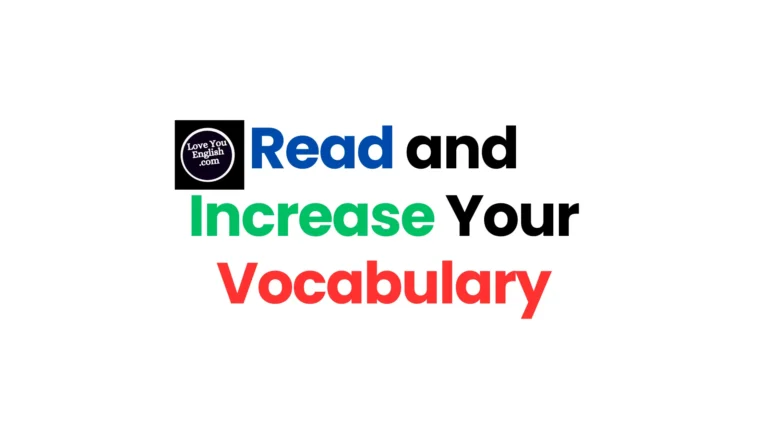
How to Read and Increase Your Vocabulary
How to Read and Increase Your Vocabulary Have you ever been in a situation where you wanted to express yourself more effectively…

25 Advanced English Verbs to Level Up Your Language Skills
25 Advanced English Verbs to Level Up Your Language Skills Hello everyone, Do you want to improve your English vocabulary even more?…
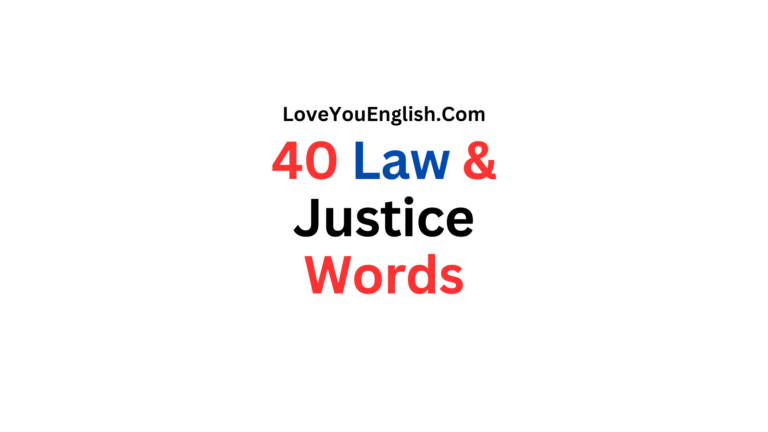
English Vocabulary: 40 Law & Justice Words
English Vocabulary: 40 Law & Justice Words Hello everyone, Today, we’ll explore 40 important words that help us understand how laws work…
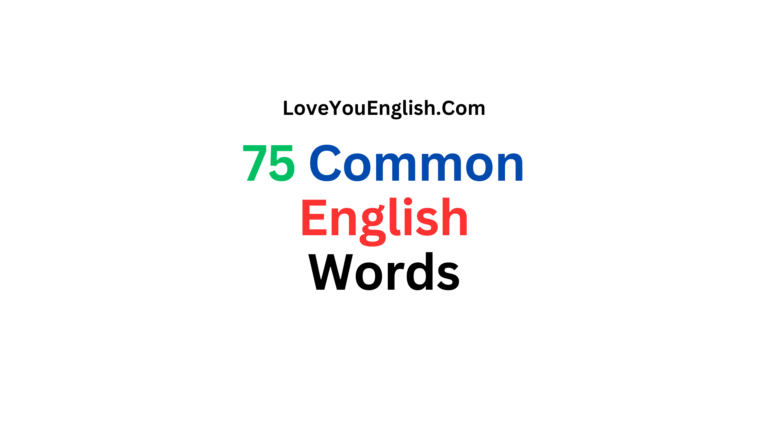
75 Common English Words Used in Daily Life
75 Common English Words Used in Daily Life Learning English can be fun and rewarding, especially when you start using common words…
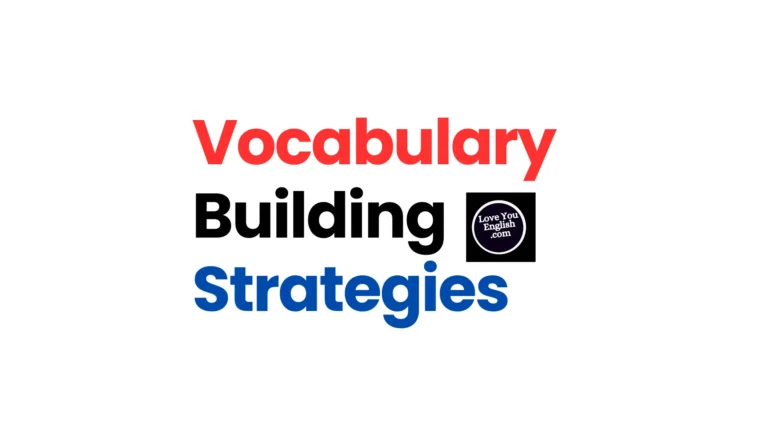
English Vocabulary: 10 Ways to Improve It
English Vocabulary: 10 Ways to Improve It Having a strong vocabulary is super important for anyone who wants to get really good…

Research and Thesis Vocabulary Words with Meanings
The main difference between a thesis and a research paper is that a thesis is a long academic paper that serves as the final project for a university degree, and the research paper is a piece of study text on a specific topic.
In short, both the thesis and the research paper are the types of students who write the subjects they need to complete in their learning life. Although there are many similarities between the two, which include the use of academic and structural writing, they are not the same.
Research and Thesis Vocabulary Words
Following are common words related to research paper and thesis writing:
- Archive: A depository containing historical records and documents
- Audit: An official inspection of an organization’s accounts, typically by an independent body.
- Challenge: A call to someone to participate in a competitive situation or fight to decide who is superior in terms of ability or strength
- Check: Examine (something) in order to determine its accuracy, quality, or condition, or to detect the presence of something.
- Checkup: A thorough examination, especially a medical or dental one, to detect any problems
- Cross-Examination: The formal interrogation of a witness called by the other party in a court of law to challenge or extend testimony already given.
- Delving: Reach inside a receptacle and search for something.
- Diagnosis: The identification of the nature of an illness or other problem by examination of the symptoms.
- Disquisition: A long or elaborate essay or discussion on a particular subject.
- Examine: A devotional exercise involving reflection on and moral evaluation of one’s thoughts and conduct, typically performed on a daily basis
- Examination: A detailed inspection or study.
- Existentialism: A philosophy that assumes that people are entirely free
- Exploration: The action of exploring an unfamiliar area.
- Feeler: A tentative proposal intended to ascertain someone’s attitude or opinion
- Framing: A framework that supports and protects a picture or a mirror
- Going-Over: A thorough cleaning or inspection
- Grilling: An intense interrogation or period of questioning.
- Hearing: The faculty of perceiving sounds.
- In Essence: With regard to fundamentals although not concerning details
- Inner Ear: A complex system of interconnecting cavities
- Inquest: A judicial inquiry to ascertain the facts relating to an incident.
- Inquiry: A question, an investigation, a request for information, or the process of seeking information
- Inquisition: A period of prolonged and intensive questioning
- Inspection: Careful examination or scrutiny.
- Interrogation: The action of interrogating or the process of being interrogated.
- Investigation: The action of investigating something or someone; formal or systematic examination or research.
- Poll: The process of voting in an election
- Postmodern: Of or relating to postmodernism
- Primal: Having existed from the beginning
- Probation: The release of an offender from detention, subject to a period of good behavior under supervision
- Probe: A thorough investigation into a crime or other matter.
- Probing: Inquiring closely into something; searching.
- Query: A question, especially one expressing doubt or requesting information.
- Quest: Search for something
- Question: A sentence worded or expressed so as to elicit information
- Questioner: Someone who questions
- Questionnaire: A form containing a set of questions, especially one addressed to a statistically significant number of subjects as a way of gathering information for a survey
- Quiz: A test of knowledge, especially as a competition between individuals or teams as a form of entertainment.
- Rehearsing: Practice a play, piece of music, or other work for later public performance.
- Reinvestigation: Decided to use modern police methods to reinvestigate the case
- Self-Examination: The study of one’s own behavior and motivations
- Self-Exploration: A process of discovering that there is something innate, invariant and universal in all human beings
- Self-Questioning: A person having doubts about what they believe or why they are doing something.
- Self-Reflection: Serious thought about one’s character and actions.
- Self-Scrutiny: A careful watch or close examination
- Soul-Searching: Deep and anxious consideration of one’s emotions and motives or of the correctness of a course of action
- Study: A detailed investigation and analysis of a subject or situation.
- Survey: Look closely at or examine
- Trial: A formal examination of evidence by a judge, typically before a jury, in order to decide guilt in a case of criminal or civil proceedings.
- Unfixed: Not firmly placed or set or fastened
Quick Links
- Words to Describe Scientist
- Words to Describe Veterans
- 8 Characteristics of Good Writing

IMAGES
COMMENTS
But to make the process of finding academic language a bit easier for you, we have compiled a list of 50 vital academic words and phrases, divided into specific categories and use cases, each with an explanation and contextual example. Best Words and Phrases to use in an Introduction section 1. Historically
Feb 9, 2024 · Dissertation Thesis College & University Assignments ... Wordvice 100+ Research Vocabulary Words & Phrases. Feb 9, 2024. 468,978.
It aims to provide you with examples of some of the phraseological ‘nuts and bolts’ of writing organised according to the main sections of a research paper or dissertation (see the top menu ). Other phrases are listed under the more general communicative functions of academic writing (see the menu on the left).
The Oxford Phrasal Academic Lexicon (OPAL) is a set of four word lists that together provide an essential guide to the most important words and phrases to know in the field of English for Academic Purposes (EAP). This list gives around 370 important phrases for academic writing, grouped into 15 functional areas. Written phrases 1.
Aug 26, 2021 · Ideally, words are included in a glossary. However, in some cases—depending on the topic—abbreviations, phrases etc. might also be mentioned within the list of glossary in a dissertation. Sometimes, it might also include a brief definition of how to pronounce a certain word/phrase.
Aug 24, 2018 · Academic Vocabulary List Informative Terms Definitions academic vocabulary Academic vocabulary means the words and phrases that are specific to a subject, task, or topic of study. audience Your audience is anyone who might read your essay. You should assume that the reader has limited knowledge of the topic, so explain all ideas completely and ...
Sep 22, 2022 · Includes useful research words and phrases used in academic papers, a sample journal submission cover letter, and a template rebuttal letter. 1-888-627-6631 [email protected]
In academic writing, it is often preferable to use medium modality words (e.g. “often” instead of “always”; “may” instead of “must”). • Tip: Only use words which you are comfortable with, otherwise your writing will sound ‘forced’ or ‘unnatural’. Suggestion: highlight the words above you feel confident with now.
Nov 4, 2024 · Study word roots, prefixes, and suffixes: Understanding these can help you guess the meaning of unfamiliar words. Use vocabulary-building apps: Many apps offer daily vocabulary exercises. Practice using new words: Try to use new words in your writing or conversations to help remember them. Conclusion
In short, both the thesis and the research paper are the types of students who write the subjects they need to complete in their learning life. Although there are many similarities between the two, which include the use of academic and structural writing, they are not the same. Research and Thesis Vocabulary Words